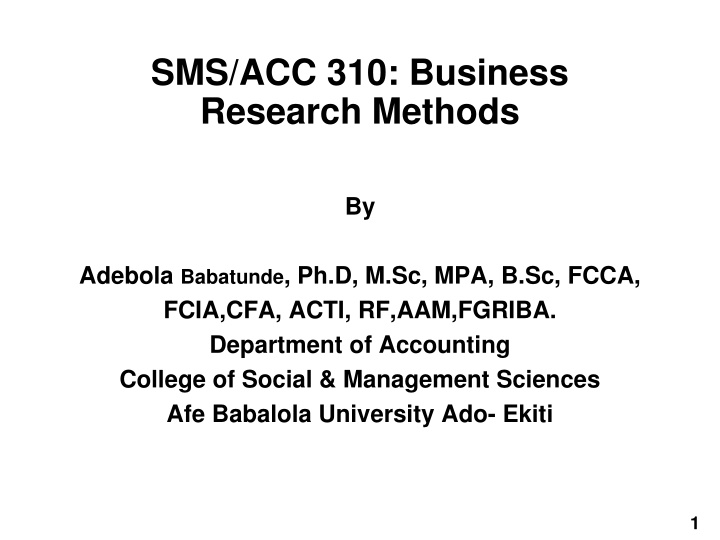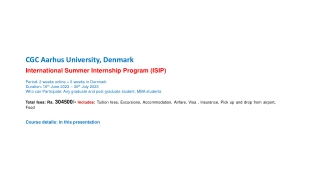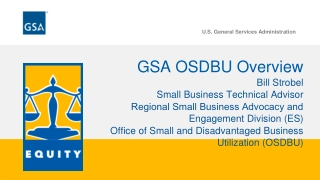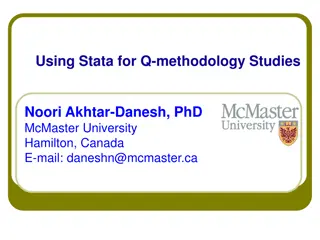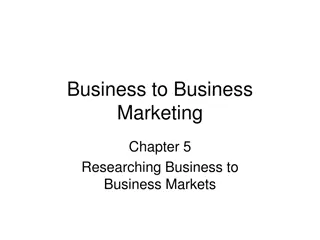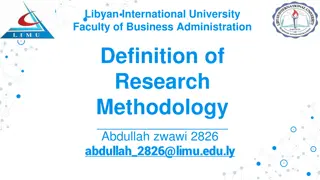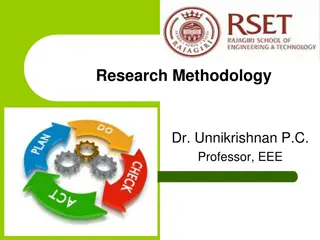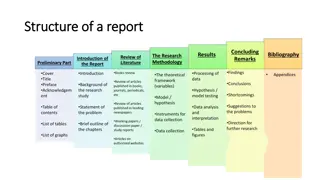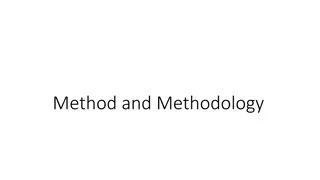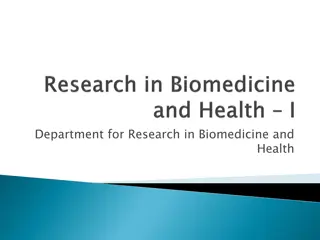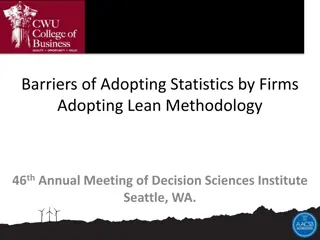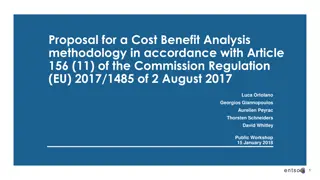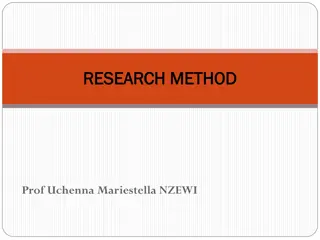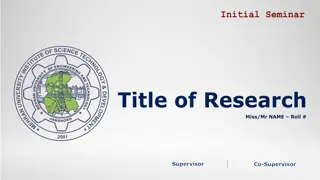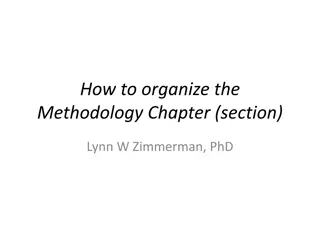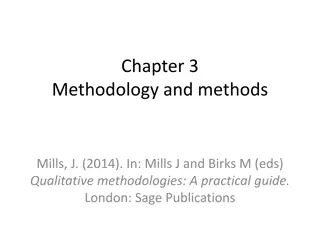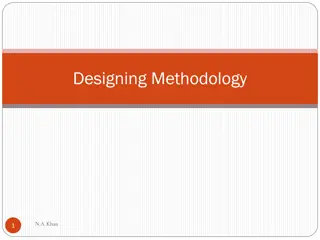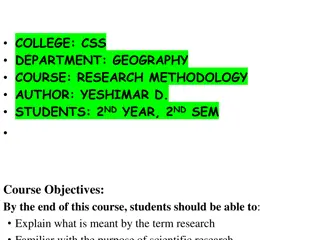Business Research Methods - Introduction and Methodology
Delve into the world of business research with a focus on nature, purpose, problem identification, and research proposal writing. Explore research methodology, data collection, analysis techniques, and interpreting findings. Discover recommended textbooks and definitions by experts in the field.
Download Presentation

Please find below an Image/Link to download the presentation.
The content on the website is provided AS IS for your information and personal use only. It may not be sold, licensed, or shared on other websites without obtaining consent from the author.If you encounter any issues during the download, it is possible that the publisher has removed the file from their server.
You are allowed to download the files provided on this website for personal or commercial use, subject to the condition that they are used lawfully. All files are the property of their respective owners.
The content on the website is provided AS IS for your information and personal use only. It may not be sold, licensed, or shared on other websites without obtaining consent from the author.
E N D
Presentation Transcript
SMS/ACC 310: Business Research Methods By Adebola Babatunde, Ph.D, M.Sc, MPA, B.Sc, FCCA, FCIA,CFA, ACTI, RF,AAM,FGRIBA. Department of Accounting College of Social & Management Sciences Afe Babalola University Ado- Ekiti 1
Course Outline - Introduction Introduction to to Business Business Research Research Methods Methods - Nature and Purpose of Business Research Method - Identification of Problems - Formulation of Research Topic - Research Proposal Writing - Research Framework/Model Formulation 2
Course Outline Contd Research Methodology: i. Research Design ii. Method of Data Collection iii. Data Analysis Technique iv. Interpretation of Research Finding v. Writing of Reports -Revision Recommended Text Books: 1. Business Research Method ( Zikmund W.G 7ThEdition). 2. Quick Guide to Project Writing (Izedonmi, P.F, 2016). 3. Research Method (Working Textbooks,2017) 3
W h a t i s R e s e a r c h ? Research is a systematic and organized effort to investigate specific problem that needs a solution 4
Research Definition ContD Adebola Babatunde, (2016): The word Research connotes Re and Search . Meaning to search for a critical phenomenon that quide in adequate decision process Adebola Babatunde, (Research Made Easy,2017): It is an entire managerial instruments that has imperative impact on organizational decision making 6
Research Definition Nachmias and Nachmias (1981, p. 22): the overall scheme of scientific in which scientists engage in order to produce knowledge Kerlinger (1973, p. 11): systematic, controlled, empirical, and critical investigation of hypothetical propositions about the presumed relationships among natural phenomena Best (1977, p. 10-12): formal, systematic, and intensive process of carrying out a scientific method of analysis which may lead to the development of generalizations, principles or theories which can result in the predictions and control of events 7
W h a t i s Business R e s e a r c h ? Zikmund, (2003,pg.8) defined business research as the systematic and objective process of gathering, recording and analyzing data for aid in making business decisions 8
WHY BUSINESS RESEARCH It serves as tool for management decision making To distinguish between basic and applied research. it enables researcher to understand total quality and its relationship to business research. To understand the managerial value of business research and the role it plays in the development and implementation to business research To explain that business research is a global activity. 9
IDENTIFICATION OF RESEARCH PROBLEMS - What are problems? - Significance of Problem Identification - Means of Identification of Problems - How to source for Problems 10
CONTD Problems are course of Action. The main reason why embarking on the research process. Significance of problems identification -It enables researcher to focus on a particular investigation -There are no new problems, given an existing and well define a new dimension in a particular course of action makes the work researchable. Means of Identification: -Self interest in the field of study Journals articles, textbooks, News etc -Observations and Interviews 11
Basis of Knowledge Agreement Somebody told it to you and you believed what you were told. It can be direct from the person concerned or indirect from one person to another (tradition) or from secondary source such as (authority). Example: You have read in the newspaper that traffic jam in Ado-Ekiti is terrible, it creates unnecessary stress: (and you agree with report) . newspaper and T.V 12
Basis of Knowledge Experiential Some of the knowledge that you possesses were the result of personal experience and discovery. Example: Your personal experience whenever you are under stress the quality and productivity of your work is adversely affected. . shows that 13
Basis of Knowledge Deductive Reasoning/Logic Knowledge discovered through the process of deducing a general statement to a specific assertion. Example: From the following two general statements: Traffic Jam in Ado-Ekiti creates stress Stress adversely affects quality and productivity We can deduce that Traffic jam adversely affects quality and productivity . 14
Basis of Knowledge Inductive Reasoning/Logic Knowledge discovered through the process of establishing a general proposition on the basis of observation of particular facts. . 15
Sources of Knowledge Sources of Knowledge Deductive Reasoning or Logic Inductive Reasoning or Logic Agreement Experiential 16
Sources of Knowledge The four sources of knowledge might not be valid and reliable. This might be due to a number of issues related to errors in personal human inquiry. For example: 1) Inaccurate Observation 2) Over-generalization and Made-up Information 3) Selective observation 4) Illogical Reasoning 5) Ego-involvement in Understanding 6) The premature closure of Inquiry Note: To overcome the danger posed by the usage of the four sources of information, researchers are advised to go for Scientific Research Method in discovering knowledge. 17
Scientific Method The scientific method is a means whereby insight into undiscovered truth is sought by: 1. Identifying the problem that defines the goal of the mission. 2. Positing a hypothesis both as logical means of locating the data and as an aid to resolving the problem. 3. Gathering data with the hope of resolving the problem. 4. Empirical testing the hypothesis by processing and interpreting the data to see if the interpretation of them will resolve the question that initiated the research. 18
Knowledge Discovery through Science 1. Sources of Knowledge 2. Scientific Approach in Research 3. Research and Definition 4. Basic Assumptions in Science 5. Purpose of Science 6. Characteristics of Scientific Research 7. Epistemology and Methodology of Research 8. Simplified Model of Research Process 19
Scientific Research Scientific research is an approach that is: 1. structured and systematic 2. empirical proven by data and facts To understand the scientific approach in research, it is better if we understand: 1. Basic assumptions in science 2. The purpose of science 20
Basic Assumptions in Science Scientific approach is based on two (2) assumptions: 1. Nature operates orderly Things/incidents occur in systematic and orderly manner - not random or chaotic. Human behaviours have certain patterns that can be detected and explained. 2. Any incident has its reasons ("determinism ) An incident operates within the cause and effects principles the existence of causes or reasons that can be detected. 21
Purpose of Science In general, knowledge can be expanded through three purposes of science. 1. Description 2. Explanation 3. Prediction 22
Purpose of Science - Description The purpose of the description is to illustrate and provide evidence of an incident correctly. To determine whether an event or phenomenon occurs or exists, and if they exist, make sure to what extent is the existence. 1. Tries to discover answers to the questions of who, what, when, where, and sometimes how. 2. Researcher attempts to describe or define a subject, by creating a profile of a group of problems, people, or events. 3. May or may not have the potentials of drawing powerful inferences. 4. Does not answer the question why. 23
Purpose of Science - Explanation An enquiry is deemed to have been completed when the causes that lead to the events were determined. In other words, to explain an event, scientific research will ensure the connection between cause and effect of the incidence. If the enquiry of the incident had a different explanation or there is a contradiction in the answers, then there is still some doubt or ignorance regarding the facts or knowledge about the incidence and thus, it should be further explored. 24
Purpose of Science - Explanation In many cases, explanations are not absolute . 1. Researchers might need additional evidence and this will lead to further research on the issues. 2. In short, Explanation goes beyond Description by attempting to explain the reasons for a phenomenon that the descriptive study only observed. 3. Researcher uses theories or at least hypotheses to account for the forces that cause a certain phenomenon to occur. 25
Purpose of Science - Prediction An explanation is said to be adequate if it enables the researcher to make predictions about the incident in the study. Having able to explain a phenomena - the ultimate goal of a researcher is to be able to predict the occurrence of the phenomena. 26
Epistemology and Methodology of Research General objective of research To discover new knowledge. To organise and systematise existing body of knowledge. To challenge existing paradigms and establish new theories. In conducting scientific research method, we need sound knowledge and skill on: Epistemology of research Methodology of research 27
Epistemology and Methodology of Research Methodology of Research (Science of Finding Out) Epistemology of research (Science of Knowing) You know where to start and what to find. Well equipped with research tools: Empirical Quantitative Qualitative Triangulation Having a good scientific mind. The subject matter of one s discipline knowledge of Sound knowledge of neighbouring disciplines. 28
Simplified Model of Research Process What data are required to answer Questions / Test the Hypotheses? Literature Theory & Other Studies Answer Res Questn & Test hypotheses Problem Statement Research Area Research questions Data Analysis Hypotheses Design Data Collection Context Conceptual Stage Empirical Stage 29
Research Process Research comprise the process of developing :- 1.The conceptual Framework 2. Theoretical framework 3. The hypotheses for testing 4. Research design, This involves the planning of the actual study dealing with such aspects as the location for the study, 5. Sample selection and 6. Data collection processes and 7.Results of the study. 30
Attributes of Research Based on other works Replicable Generalizable Tied to theory Doable/Achievable Generates to New Questions Incremental Apolitical/Neutral 31
Conclusion Knowledge* gained from research in the form of a scientific approach is different from other approaches. All beliefs, or assumptions must be tested - not just by one researcher but also by other researchers; not just once but several times in various places by as many other researchers. ** Unless it is in the form of REVEALED KNOWLEDGE from GOD. 32
How to choose an Appropriate Research Problem? 33
How to choose an Appropriate Research Problem? Identify broad area of research interest Literature survey/mapping Develop article abstract Avoid direct copying Make sure complete references are recorded 34
Read recent Research Refereed & professional journals Accounting literature/ abstract index Previous reports or theses such as UMI index AAA/ Proceedings Internet-SSRN, Other repositories L I B R A R Y 35
Attending research meeting . Workshops Seminars Networking 36
Consultation/Advice Managers Supervisor/ Lecturer 37
Suggested areas for Research projects (not exhaustive) Error characteristics (Auditing) Risk evaluation (Auditing) Determinants of audit hours (Auditing) Job satisfaction (MA) User Information Satisfaction (AIS) The use of Accounting Software (AIS) Internal Control Evaluation (Auditing) Audit delay (Auditing) Budgetary participation (MA) 38
Suggested areas for research projects (ContD) Audit Expectation gap (Auditing) Internal Control, IT & Governance (Forensic Auditing) Self Assessment System (Taxation) Tax planning (Taxation) Tax compliance (Taxation) Work culture (MA) ICT and Fraud Prevention ( Forensic Accounting) Information Systems and Financial Report ( AIS) Value chain in organization/production (MA) Activity Based Costing (MA) The Use of Financial Ratios (FA/Audit) IT Compliance/Techniques and Information Security Governance ( AIS/Forensic Accounting) Modern Techniques in Financial Statement Reporting (AIS/Forensic Accounting) 39
Have a nice day Thank You ( Nagode, Daalu, Imela, Adupe, Gracias,Makasih, Suchran) Email:dradebolababatunde@abuad.edu.ng dradebola@yahoo.com Phone Number: +2348039952554 40
